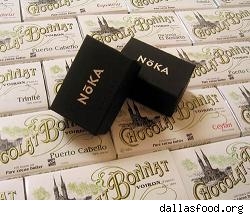Blog called DallasFood is making big, brown waves with a ten-part (ten part!!) series about a small, Plano, Tex., chocolate-maker called NoKa. Point being, for starters, that NoKa's not a chocolate-maker per se but a chocolatier who purchases commercially packaged chocolate bars from a third party and uses them to make, or confect, a chocolate couverture. In installments of Dickensian intensity, DallasFood ferrets out the source of NoKa's chocolate: Bonnat, a respected firm based in the French Alps that actually processes beans from chocolate plantations in Africa, Asia and South America.
DallasFood's main point is that NoKa is charging a lot of money, between $300 and $2,000 a pound, for very little work (since when has that been a crime in Texas?), and misrepresenting its products besides (again, SOP for Texas). If only the same level of passionate, investigative journalism had been applied to the search for WMD!
Other blogs have chimed in, generally echoing DallasFood's shocked, shocked reaction. And a blogger who tried to defend NoKa turned out to be a flack. Some Texans, it seems, are as passionate about their chocolate as Cornichon is about salmon...or pizza.
Here in Seattle, we actually have the country's only independently owned, genuine bean-to-bar chocolate maker. That would be Theo's, in Fremont, where founder Joe Whinney and his team import organic, fair-trade cacao beans from Ghana, Ivory Coast, Madagascar and Venezuela, and sell 3-ounce, single-origin bars of chocolate (sweetened with organic Swedish sugar) for $5.25 to $6 apiece. Which works out to well under $100 a pound. Repeat after me: buy local, buy local, buy local!

Buying local isn't very meaningful when the underlying material comes from half the world away.
If Joe Whinney managed to grow cacao in his backyard, your repetition of the "buy local" slogan would make more sense, Ronald. But if as a society we're hooked on products that we can't grow in our locale (coffee, anyone?) then what matters is
1. how good it tastes
2. Fair trade, shade-grown and all that
3. price/value
4. retailing -- local or chain (say Starbucks vs. corner cafe). Now here you might have occasion to plug the local, independent venue. (But at least you have to respect a Starbucks for its labor policy, its buying of fair-trade beans, and its give-backs to certain communities where it obtains its beans).
Not having tasted Mr. Whinney's wares, I can't tell you how good they are compared to others. But he should have to prove himself on more grounds than simply being "local."
Excellent point. Perhaps that last line should read "Repeat after me: even if the raw materials come from half a world away, do what you can to buy local, etc."
Ronald,
Thanks for noticing the reports on Noka. I'd like to make one clarification to how you've characterized the story, if you don't mind.
You wrote, "NoKa's not a chocolate-maker per se but a chocolatier who purchases commercially packaged chocolate bars from a third party and uses them to make, or confect, a chocolate couverture."
I never claimed that Noka is buying "commercially packaged chocolate bars." It is my belief, for reasons set out in the article, that Noka is buying blocks of couverture from Bonnat. As far as I know, the blocks of couverture are not available at the consumer level in the US. (If you contact Bonnat directly, however, they are willing to sell it to individuals as well as businesses.) This is a small point, but I didn't want there to be any misunderstanding.
You're lucky to have Theo up there--organic, Fair Trade Certified, and (like you said) reasonably priced.
Scott
Commercially packaged, as I see it, doesn't mean "available to the general public." Noka was buying wholesale, it seems.